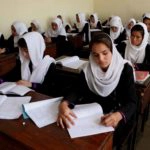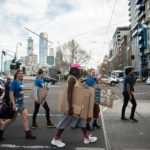Media Centre - 22 September 2021
New research reveals half of Australian boys and young men have poor or non-existent school education on periods
Plan International Australia, the charity for girls’ equality and leading period care brand U By Kotex are calling for greater – and earlier – education about periods in schools
The call comes following a new survey released today revealing that Australian boys are not receiving adequate education about periods, leading to misinformation and increased stigma associated with menstruation.
The YouGov poll, commissioned by Plan International and U by Kotex, focused on male attitudes towards periods, with 300 young men aged 16-21 years surveyed across Australia in August 2021.
Close to half (49%) of respondents said their education on periods was poor or non-existent and just under one third (32%) said that talking about periods made them feel uncomfortable, increasing to 53% in the youngest respondents aged 16-18 years.
When asked what words they associate with periods, almost three-in-five (58%) said ‘messy’, while almost a quarter (23%) said ‘embarrassing’ and ‘dirty’, and one-in-five (19%) say periods ‘should be kept secret’. In addition, more than four in 10 said they have also witnessed bullying around periods.
Almost 15% of those surveyed believe periods are “impure”, and over four in 10 boys and young men said they had witnessed another man making a negative comment to a girl about her period. When asked why they felt uncomfortable talking about periods, boys said they felt “awkward”, “uneasy”, “weird”, “anxious” and “gross” about the topic.
“I feel uncomfortable talking about something that I do not fully understand,” said an 18-year-old boy from South Australia, while a 19-year old boy from Victoria said he was uncomfortable “because I am not a woman and male involvement with this topic is usually seen as perverted and unnecessary.”
“It’s hardly talked about… it’s taboo and I haven’t been taught much,” added an 18-year-old from NSW.
“I go to an all-boys school – it is not a topic that is brought up,” said a 16-year-old from NSW.
These beliefs and attitudes can have a significant impact on a girls’ wellbeing and educational opportunities. A significant percentage of young Australian people who menstruate – especially those for the first time – are afraid of being teased about their periods.
Research earlier this year by Kimberly-Clark found almost a third of Australian girls aged 10-14 are missing school because they’re embarrassed about their periods, while almost half of those aged 10-18 said they were afraid of being teased.
While these findings are cause for concern, they also reveal a solution – the need for earlier and better education about periods for young men. The polling revealed that 70% of those who described their school education on periods as ‘good’ also said they felt very comfortable discussing periods.
This demonstrates that educating boys on menstrual health can have a positive impact on ending period shame and stigma, and normalising periods from a younger age. Some of the words these boys associate with menstruation are “natural” and “healthy”.
Susanne Legena, CEO of Plan International Australia, said:
“Girls are missing school, being bullied and dealing with distress – all because we are not talking enough about periods, particularly with boys.”
“While gender inequality may disproportionately affect women and girls, it also directly impacts men and boys too. No boy should feel he has to live up to a certain image or behaviour, to fulfil the stereotype of what it means to be a man.”
“Addressing the unique barriers and challenges that prevent girls and women from reaching their full potential, such as period shame and taboos, is one of the most effective ways to create gender equality for all people around the world.”
Kimberly-Clark and Plan International Australia are committed to creating a world where periods do not hold girls back from reaching their full potential. Towards this end, they have developed successful educational programs aimed at boys in schools and communities in Australia and all around the world.
Plan International Australia and U By Kotex believe that by ending period stigma, we can allow people to manage their periods with pride. You too can help create a world where period shame doesn’t stop a girl from going to school, getting an education and living a healthy life.
FURTHER INFORMATION
About the survey
YouGov conducted this poll with a nationally representative online sample of 316 male Australian residents aged 16-21 between 11-20 August 2021. The theoretical margin of error is ±5.5 percentage points. Due to rounding, totals for results may not add to 100.
About Plan International Australia
Put simply, we’re the charity for girls’ equality. We tackle the root causes of poverty, support communities through crises, campaign for gender equality, and help governments do what’s right for children and particularly for girls. We believe a better world is possible. An equal world; a world where all children can live happy and healthy lives, and where girls can take their rightful place as equals.
Plan International’s WASH (Water, Sanitation and Hygiene) experts work in over 80 countries distributing menstrual hygiene materials and teaching young people about the menstrual cycle. Together with local governments and schools, Plan International also trains district health workers, teachers and volunteers to educate young people about periods and talk about them in a shame-free, positive way.
In Ghana, Plan International has set up a health club focused on menstrual health and management at the school of 13-year-old Cephas. He discovered many of the things he had been told about periods were wrong and is now helping to end period stigma by helping with the distribution of menstrual health products and leading a health campaign that is challenging the taboos about periods.
“It is my dream to see boys and men embracing the thought that menstruation is a natural occurrence in the lives of women and girls and not to be seen as unclean. After learning so much from the health club, I feel bad about how I have treated my sisters,” he said.
About Kimberly-Clark & U by Kotex
Kimberly-Clark is aiming to educate five million people across ANZ to fight menstrual stigma and alleviate period poverty for 500,000 women and girls by 2030. The U by Kotex ‘What’s Happening to You’ menstrual education program has been trusted by teachers across Australia and New Zealand since 2015, with more than one million students having now participated in the program.
QUOTES
Plan International Australia ambassador Benjamin Law
Benjamin said his early education on periods came from growing up with his frank single mother of five, and three matter-of-fact sisters.
“When you’re raised in a household of strong no-bull women, you learn about periods,” he says. “With five kids sharing one bathroom – and as a family member who was sometimes sent out to buy sanitary pads from the supermarket – periods weren’t really a mystery to me growing up.
“Yet I know my family’s an outlier. So many people – of all genders – still regard a healthy and regular function of the human body as shameful, dirty or embarrassing. And that stigma needs to be eradicated.”
Plan International Australia youth activist Elizabeth Payne, 22
Elizabeth said when she was at high-school, boys would make derogatory remarks about menstruation. “They’d often say ‘she must be on her period’, usually behind our backs or about someone who wasn’t in the conversation. Many boys equated periods to defecating or urinating, and something that shouldn’t be openly talked about, but some were genuinely curious.”
“I also distinctly remember boys asking girls for unused tampons and putting them in bottles of water to see them expand. This curiosity could have been captured by the school and transformed into a great learning moment, but instead they were told that this was inappropriate and got in trouble,” she said.
Elizabeth said she did miss school because of period stigma and shame: “I often missed school the first day or two of my periods because I had bad cramps and a heavy flow and was worried I wouldn’t be able to manage it at school. The idea that we have to ‘manage’ our periods, and ourselves, is wrapped up in misogyny; that we have to keep our periods and our pain hidden from the eyes of others, particularly men, or we are seen as unprofessional, or a mess. Part of why I stayed home was the fear that I would bleed through my pad and boys would see, and I would be marked for the rest of high school as that girl who bled on her school skirt.”
Media contacts


